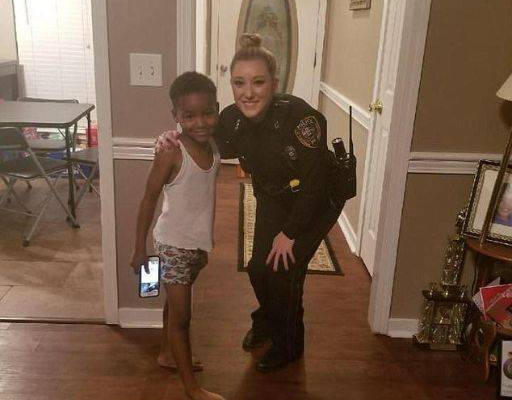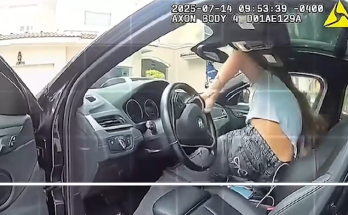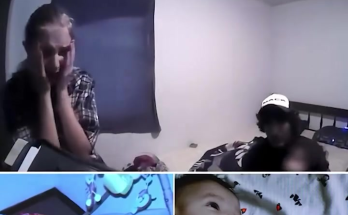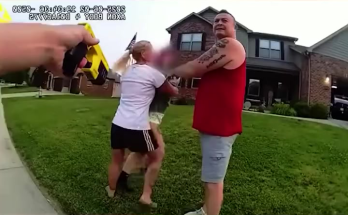
It was a quiet Thursday night when a routine dispatch turned into something extraordinary. At the local 911 center, an alert came through—an unanswered emergency call. No words, no panic, just an open line and the faint sound of breathing before the call ended. As per protocol, an officer was sent to check the location: a small, modest home tucked in a quiet residential area. There was no way to predict the heart-stirring encounter that was about to unfold.
At the doorstep stood Mateo, a barefoot eight-year-old with solemn eyes and a firm grip on a cell phone. Despite his age, there was no trace of panic. Calmly and clearly, he looked up at the officer and said:
“I’m hungry. We haven’t eaten all day.”
The officer’s heart sank.
Inside the house, everything was tidy—meticulously so. The kind of clean that only comes from someone trying to hold things together. There was no mess, no signs of neglect. But the fridge? Nearly empty. A bottle of water. A half stick of butter. One container of ketchup. In the next room, a younger girl—Sofia, maybe four or five—lay sleeping under a thin blanket. She stirred a little but didn’t wake.
Mateo didn’t cry. He didn’t beg. He simply stood there, shoulders back, holding space for both himself and his little sister, waiting for someone to notice their quiet crisis.
The officer radioed for backup—not for enforcement, but for help. Within minutes, paramedic Rosa arrived, carrying food from a nearby gas station: sandwiches, juice boxes, bananas. She placed the bag on the table and gently urged Mateo to eat.
But instead of tearing into the food like most hungry children might, Mateo quietly took a sandwich and set it aside.
“That’s for Sofia,” he said.
His priorities were clear—he’d been protecting his sister long before anyone else showed up.
When the responders encouraged him to eat, he finally took a small bite. As he chewed, his shoulders relaxed and a flicker of relief crossed his face. The officer and Rosa stayed. They couldn’t bear to leave the children alone in that moment.
Rosa offered to remain with the kids while the officer tried to find their mother, who was reportedly working a late shift. They suspected she might be unaware of the call, possibly without access to her phone. Eventually, after asking around nearby businesses, they located her at a local diner, panicked and exhausted.
She had left her phone at home in a rush to make it to work on time and had been unreachable. When the officer explained what had happened, she broke down in tears—not out of guilt, but out of sheer overwhelm. She was doing everything she could, juggling long hours and unpredictable shifts, and still falling short of providing basic necessities. Her love for her children was never in question—her circumstances were simply too hard.
When she arrived home and saw Mateo and Sofia safe, she dropped to her knees and embraced them tightly. Mateo leaned in, whispering something into her ear that made her cry harder—but this time, from relief.
Rather than punish or escalate the situation, social services made a decision to support. They assessed the home, spoke with the mother, and found that this was not a case of neglect, but one of survival. The family was given immediate referrals to local food banks, childcare programs, and financial aid services. That night didn’t end with sirens or separation—it ended with humanity.
But the story didn’t end there.
The experience stayed with Rosa long after her shift ended. She couldn’t forget Mateo’s eyes, his quiet resilience, the way he instinctively protected his sister. Inspired by what she saw, Rosa decided to act. She started a volunteer-based project called Midnight Meals—a grassroots initiative aimed at delivering warm meals and essential supplies to families caught in similar circumstances. She gathered volunteers from her department and the community. Word spread quickly. Donations came in, local restaurants offered support, and within weeks, hundreds of meals were delivered to homes where hunger had silently taken root.
Months later, Rosa and the officer returned to Mateo’s home—not in uniform, but as friends. Mateo ran to the door smiling, now wearing socks and slippers. The kitchen was stocked. Sofia was laughing in the background. Their mother, though still working hard, stood taller. There was food in the pantry, light in their faces, and warmth in their eyes. Gratitude poured out—not in words, but in presence.
What began as a silent distress call turned into something profound.
This wasn’t a headline or a viral story. There were no grand gestures, no breaking news, just ordinary people doing the extraordinary—quietly answering the call, not just of duty, but of compassion.
Because sometimes, the bravest thing a child can do is pick up the phone.
And the most powerful thing a responder can do… is listen.



